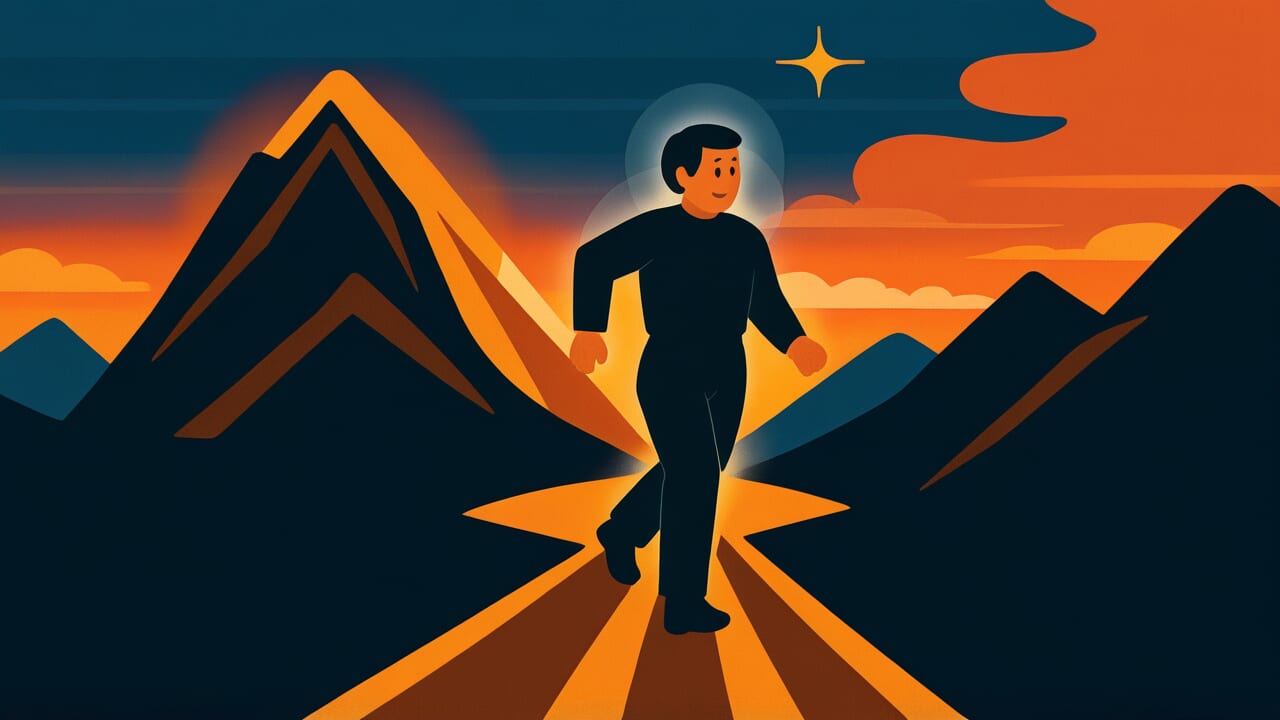How to Read “Entering the mountain at sunset”
Higure no yamairi
Meaning of “Entering the mountain at sunset”
“Entering the mountain at sunset” is a proverb that warns against starting something at a dangerous time or in a bad situation.
Just as entering a mountain after sunset is extremely dangerous, this saying cautions against the foolishness of beginning new things at the wrong time or taking action when conditions have already gotten worse.
This proverb is used when someone tries to jump into a difficult situation without proper preparation. It also applies when someone insists on pushing forward even though conditions clearly aren’t right.
For example, it describes starting a new business when funds are running out. Or pushing yourself to work when your health is declining.
The lesson of this proverb hasn’t faded in modern times. In fact, in today’s fast-paced society, we need calm judgment more than ever to recognize “now is not the time to start.”
Courage and recklessness are separated by a thin line. This proverb gives us perspective to tell them apart.
Origin and Etymology
No clear written records document the origin of this proverb. However, looking at its components, it appears to be an expression that condenses the wisdom of life in Japan’s mountain villages.
Two elements combine here: “sunset” and “entering the mountain.” In Japan since ancient times, mountains were sacred places and dangerous places at the same time.
Beasts lurked in the mountains. Paths were treacherous. Once you got lost, your life was at risk.
Mountains after sunset were especially dangerous. Visibility disappeared. Your sense of direction became unreliable.
In an era without flashlights, dark mountains were literally spaces where death waited nearby.
For people who worked in mountains, hunted, or traveled over mountain passes, “leaving the mountain before sunset” was an absolute rule.
Conversely, entering a mountain at sunset was recognized as a reckless act, like throwing yourself into danger.
This lesson based on real experience gradually took on metaphorical meaning. It became established as broader life wisdom: “don’t start things at dangerous times.”
A lesson from a specific place—the mountain—was elevated into wisdom that applies to all of life.
Usage Examples
- It’s already evening, so climbing now would be entering the mountain at sunset. Let’s go tomorrow morning.
- With cash flow this tight, opening a new store would be entering the mountain at sunset.
Universal Wisdom
The proverb “Entering the mountain at sunset” contains deep insight into two contradictory human traits.
One is the courage and willingness to move forward even in difficult situations. The other is the danger that this courage can sometimes transform into recklessness.
Why do people try to take action even when conditions are clearly bad? It’s because they’re driven by anxiety, impatience, or the obsessive thought that “I must do this now.”
Psychology kicks in: don’t want to miss opportunities, don’t want to fall behind others. Also, after you’ve already invested a lot, turning back becomes difficult.
The mindset of “I’ve come this far” can push you toward even more reckless actions.
But our ancestors saw through this human nature. They knew courage and recklessness are completely different things. True courage sometimes lies in “waiting” or “turning back.”
The decision not to enter a mountain after sunset isn’t cowardice. It’s wisdom.
This proverb has been passed down for so long because humans fundamentally cannot free themselves from the emotion of “impatience.”
Even as times change, people repeat the same mistakes. That’s why this simple teaching still resonates in our hearts today.
When AI Hears This
When the sun sets in the mountains, the amount of information humans can obtain drops dramatically and suddenly.
Visual information degrades logarithmically with light levels. By the time you start feeling it’s dim, information quantity has actually fallen below half.
For example, your ability to distinguish path forks, identify tree roots and rocks, and recognize distant landmarks all fail simultaneously.
What’s frightening here is that while information decreases, the number of decisions you need to make actually increases.
A path you could confirm once in daylight now requires you to judge “is this really the right way?” every few meters in darkness.
In other words, a fatal reversal occurs: the information needed per unit time increases while the information you can actually obtain decreases.
Information theory tells us that when channel capacity falls below demand, error rates skyrocket.
Sunset in the mountains is exactly this state. One judgment error distorts the premise of the next judgment, and errors amplify in a chain reaction.
Small deviations you could self-correct in daylight develop into irreversible disasters in darkness. This happens because the information balance collapses.
Lessons for Today
What this proverb teaches you today is “the strength of waiting.” We’re constantly told to start something, to move forward. But sometimes we need the courage to stop and let things pass.
Modern society makes this especially difficult. On social media, you easily see others’ successes, which makes you feel impatient.
The illusion that “everyone is moving ahead” can push you toward unreasonable actions.
But your pace is yours alone. Just because others are climbing the mountain doesn’t mean you need to rush after them at sunset.
What matters is having the eye to calmly assess your own situation. Is now a time for preparation, or a time for action?
Not making mistakes in that judgment ultimately becomes the fastest and safest path to your destination.
When you feel impatient, remember this proverb. Starting tomorrow morning, with full preparation and bright sunlight, gives you far better chances of success.
Wise retreat or postponement is never defeat. It’s groundwork for your next victory.



Comments